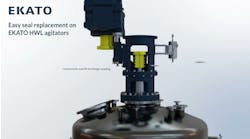Technology and regulations will make chemical operations increasingly energy efficient. For instance, sites adopting digital fieldbuses gain access to data on equipment health that can provide early warning of performance degradation as well as diagnostic information that can lead to true predictive maintenance (see "Take Advantage of Fieldbus"). This surely will pay dividends not just in reliability and uptime but also in energy efficiency. Meanwhile, U.S. plants invariably will save energy as they buy new motors and replace worn-out ones with units that comply with more-stringent federal efficiency standards that took effect in December (see "Understand the New Motor Standards").
[pullquote]Obviously a comprehensive approach to enhancing energy efficiency coupled with enduring efforts not just to maintain but to build upon improvements will lead to the greatest gains. So, not surprisingly, major chemical companies are devoting considerable attention to broad-based energy efficiency initiatives, as our cover story documents.
Some smaller firms and individual plants may argue they lack the staffing and resources to replicate what large companies and sites are doing to boost energy efficiency. Okay, I can buy that in some cases.
What I can't fathom, however, is why some chemical makers aren't taking steps that are fairly obvious and that generally provide fast paybacks. Three relatively recent CP online surveys indicate a level of inaction that's hard to understand, let alone condone.
In one we asked: "When was the last time that your plant audited its compressed air system?" More than a quarter of respondents said "never" and 16% indicated the last time was three or more years ago.
To quote from "Energy Savings are Often Disguised as Problems": "Carefully managing compressed air can save money. Compressed air is often overlooked in energy studies because many people do not fully understand compressed air equipment, their own system, or what it costs to produce compressed air power." The need to pay attention to compressed air also comes through clearly in "Cut the Cost of Compressed Air." It stresses that a careful review of a compressed air system likely will reveal multiple opportunities to reduce energy draw and, thus, dramatically lower operating costs.
A second online poll asked: "Does your plant conduct a comprehensive audit of its steam system?" Nearly 40% of respondents answered "no" and an equal number said such audits took place only on a sporadic basis.
Yet, As "Do Your Own Steam Survey," points out, auditing requires only modest expenditures on hardware -- a thermal gun and sonic device are essential but also springing for an infrared camera often makes sense because it can save time. Software to analyze steam use and savings opportunities is readily available. The U.S. Dept. of Energy's Industrial Technologies Program offers a "Steam Systems Tools Suite" (for more information, go to www1.eere.energy.gov/industry/bestpractices/software_ssat.html), as well as training on the software. As an alternative, many steam system component vendors and consultants are more than happy to perform audits.
The economic benefits often are substantial. For instance, Dow Chemical's St. Charles Operations in Hainesville, La., reaped savings of more than $1.9 million annually, with costs to improve operations paid back in about six weeks ("Steam Projects Provide Fast Payback").
Our third online poll asked: "How recently have you done an energy audit of your site?" While 39% of respondents reported such an audit was done within the last year, 18% said "never."
An annual checkup makes sense, counsels "It's Time To Review Your Plant Energy Systems." It recommends looking at ten aspects — including motors, hydraulics, the air system, steam, insulation and even non-process systems like lighting.
Furnaces and boilers often offer opportunities, notes "Take a Fresh Look at Your Process Heaters," and "Take a Fresh Look at Your Process Heaters — Part 2." A key point about enhancing energy efficiency is that it must involve ongoing efforts. In some cases, achieving initial improvements isn't that hard, what's tricky is sustaining them. "Make Your Energy Savings Permanent," suggests five ways to retain the gains.
Plants must get in the habit of paying more attention to energy efficiency and conducting more frequent and comprehensive auditing.
Mark Rosenzweig is Chemical Processing's Editor in Chief. You can e-mail him at [email protected]


